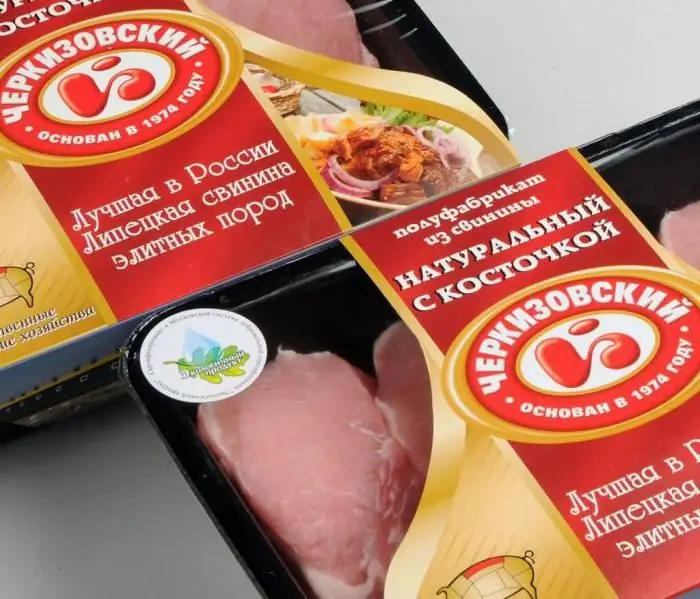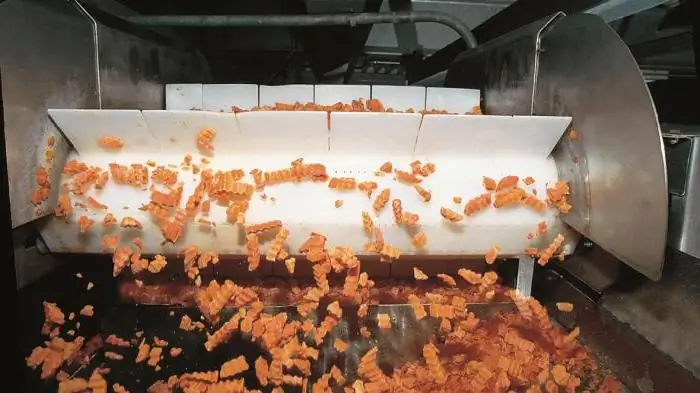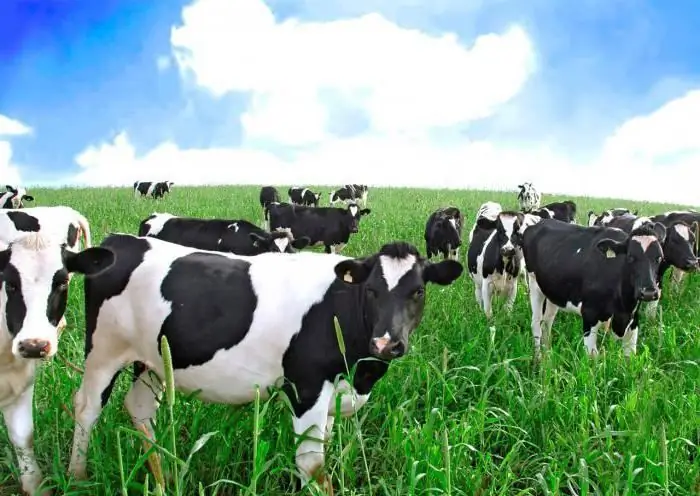2026 Author: Howard Calhoun | [email protected]. Last modified: 2025-06-01 07:12:56
In the economy of any state, the role of the food industry is huge. Currently, there are about 25 thousand enterprises in this industry in our country. The share of the food industry in the volume of Russian production is more than 10%. The dairy industry is one of its industries. It includes enterprises that produce their products from milk. The scale and uniqueness of production are determined by the number of inhabitants, their creative and genetic potential.

Global dairy and meat industry
All states have a food industry, however, in terms of its development level, it differs significantly in different countries. The undisputed leaders are economically developed states. In addition, many industries, including the dairy and meat industries, have an international specialization. This means that some states are large exporters, while others are large consumers.
Meat industry -this is an international specialization branch of European countries (especially France, Italy, Germany, the Netherlands, Spain, Belgium and Denmark), North America, New Zealand, Australia, as well as some developing countries (Brazil, China, Uruguay, Argentina). The countries of Western Europe are considered the largest exporters of these products to the world market. They account for about 50% of all world exports. The industry leaders are also the USA, Australia and Brazil. The largest importers of products are the states of Western Europe, Japan and Russia.
Dairy products are produced in Europe, as well as in the USA, Belarus, Russia, Ukraine, New Zealand and Australia. Finnish and French butter, cheeses from Germany, France, Switzerland, the Netherlands and Lithuania, sour cream from Estonia and Finland, yoghurts from Germany and France have gained wide popularity. The leaders in the supply of dairy products to the international market are the states of Europe (especially Northern and Middle), as well as Australia and New Zealand. Its main importers are the CIS countries and China.

Features of dairy production
Milk in its nutritional properties is the most perfect type of food. It has an almost perfect balance of nutrients. Dairy products account for a significant proportion of the human diet. Researchers have calculated that their annual consumption is about 16% of all types of food.
Dairy production has one important feature:the result is perishable products. In addition, they belong to the goods characterized by a high rate of consumption. This means that their production should be large-scale, and the range should be steadily expanding.
A bit of history
Milk processing in pre-revolutionary Russia was mostly handicraft. During Soviet times, the dairy industry became a major industry. Already in the 1930s, it received great development. It was then that as a result of the collectivization of agriculture and the industrialization of the country, conditions were formed for the active growth of manufactured products. At this time, the dairy industry was developing especially actively in Moscow, Leningrad, Kislovodsk, Sochi, Kuibyshev, Sverdlovsk. Large dairy plants were established in these cities. In the 1970s, the USSR ranked first in the world in terms of animal butter and milk production. Today, factories and combines produce a wide range of products. They are equipped with automated and mechanized lines for filling bags, bottles and other types of containers, coolers and pasteurizers, evaporators, separators, cheese makers, etc.
Dairy location factors
These enterprises are placed depending on the availability of the consumer and raw materials. They are concentrated mainly in highly urbanized areas.
The following are the most significant economic factors for the location of dairy enterprises:
- location of respective farms in relation to marketssales, as well as the presence of processing enterprises in this place; condition of communication lines and vehicles; availability of containers for storage of final products and raw materials;
- production potential, expressed in the already created livestock, production buildings and agricultural facilities;
- production efficiency in terms of economics;
- stability and features of inter-regional relations in the field of dairy farming;
- security of means of production supplied by industry.

Modern market trend
The number of butter and dairy enterprises is relatively stable. However, there is currently a trend in the market towards larger molds. Large firms often buy up small factories, thus expanding the sales area and production capacity. In addition, the purchase of modern equipment, which improves the quality of products and maintains the reputation of the manufacturer, is financed mainly by large enterprises. Industry profits in just one year, from 2009 to 2010, grew by 36.8%. This was due to the successful operation of national and regional market leaders.

Shortage of raw milk
Dairy businesses face a number of challenges. One of the main ones is the production of raw milk. The fact is that milk production inhave been steadily decreasing in recent years. This means that processing enterprises face the problem of shortage of raw materials, which, in turn, leads to an increase in prices for it. In addition, raw milk produced by Russian producers is often of unsatisfactory quality. This creates additional difficulties in the production of high quality products. Businesses are being forced to use dry and artificial additives, leading to increased production costs and reduced product value.
Organizational problems
Currently, the dairy market in our country is experiencing serious difficulties. We can state the absence of a unified strategy for its development, internal disorder. There is also no clear system of state support for this industry.
Russia's dairy industry is currently fragmented. Each processor and manufacturer tries to cope with the solution of the problems of his company alone. As a result, the development of the dairy industry in our country is significantly slowing down. Industry unions that bring together processors and milk producers, unfortunately, have been unable to develop a unified strategy for protecting this industry.
Requirements for the production of products coming from government officials are multidirectional and politicized. Each association, each industry participant comes up with its own proposals and requirements, often contradicting each other. The state, in response to this, offers its own vision of solving the problems faced by the dairy industry,which is convenient for officials. However, the market often cannot agree with him. The state now needs to draw up a clear business plan for 30-50 years ahead.
The dairy industry in Russia is highly disintegrated. Processors and milk producers are often in opposition to each other. Common sense and world experience suggest that two industries - milk production and processing - are parts of one system. It is impossible to raise the industry if only milk production is supported, since an increase in its production will require its processing. In the same way, the development of only a processing industry will lead to a shortage of raw materials. Only importers will be able to quickly fill it.
Other problems
To the main problems listed above that impede the development of such an industry as the dairy industry in our country, the following should be added:
- seasonality of milk production in our country;
- lack of milk collection points, lack of refrigeration units on farms;
- moral and physical depreciation of fixed assets of factories, the construction of most of which dates back to the 70-80s of the last century.
Many of the problems listed above need to be addressed at the state level. They require joint efforts of enterprises. This is the only way to solve many problems of the dairy industry.

Russia in the global dairy market
Our country is a major importer, but it cannot be called a major playerglobal market. Russia is actually not represented in the main world associations. This has a very negative effect on the development of the industry. The market of our country does not take part in the discussion of global problems. He does not know what are the global trends in the development of such an industry as the dairy industry. He also does not apply instructions, innovative and scientific developments that are used by the world's largest associations. Both processors of milk and its producers, as well as end consumers, suffer from this.
Main producers
Today there are quite a few manufacturers of goods in this industry in our country. However, only a few dairy enterprises sell their products in most regions of Russia. According to experts, the market leaders in our country are the following companies (2012 data):
- Unimilk.
- "Wimm-Bill-Dann".
- Ochakov Dairy Plant.
- Voronezh Dairy Plant.
- Piskarevsky Dairy Plant.
- Permmoloko.
- "Danone".
- Rosagroexport.
- "Ehrmann".
- Campina.
Competition in the market
The share of Wimm-Bill-Dann, the leader in the domestic dairy products market, was estimated at 10.8% in 2012. Note that the share of its closest competitor is about 4 times lower. One could say that the food dairy industry in our country is characterized by relatively high competition. But you need to havemind that many products have a short shelf life. In addition, they require special storage conditions. In this regard, the degree of competition in local and regional markets is much lower. As a result, it turns out that in some regions, local leading plants or industry leaders receive from 30 to 70% of the entire dairy products market. Other local firms or firms from neighboring regions share the rest.

Import goods
Imported goods compete with Russian products. In general, the share of imports is small, it is estimated at between 15 and 19%. This is due to the fact that the dairy market has a natural defense against foreign competitors, since the goods are perishable and require special conditions for transportation and storage.
Nevertheless, in some categories that have a long shelf life, it is imported products that lead the Russian market. In particular, foreign brands account for 30% of sold butter and 60% of cheeses. The import of dairy products and milk is also actively growing. The volume of imports of condensed cream and milk into the country in 2012 increased by 124.6%, cheese - by 34%, butter - by about 21%.

The production of dairy products in Russia is not enough, so our country is forced to import condensed milk, cheeses and butter in large volumes. As for the market of whole-milk products, it is fully provided by domestic production. For the period from 2009 to 2012, the total volume of cheese imports amounted to $7.5 billion, butter - $2.15 billion. In the annual resources of cheese and butter, the share of products imported into the country from abroad is approximately 40%.
Recommended:
Real estate development and its role in economic development. The concept, types, principles and foundations of development

In the framework of this article, we will consider the organization of the real estate development system and its role in economic development. The basic concepts, types and principles of organization of the development system are considered. The characteristic features of the system in Russian conditions are considered
Meat processing enterprises, meat processing plants in Russia: rating, products

Today, a huge number of enterprises are engaged in meat processing. Moreover, some are known throughout the country, and some - only on the territory of their region. We offer to evaluate the most powerful meat processing enterprises in Russia in terms of productivity, which have the largest revenues and high turnover. Below is a list of such companies. It is based on consumer feedback
Food industry in Russia: development and problems

A person has one need, which always and in any conditions needs to be satisfied. Whoever you are, whatever social position you occupy, you cannot do without good, good-quality food. It is not surprising that for a long time the food industry in one form or another has been the backbone of the economy of many states
Meat: processing. Equipment for meat and poultry processing. Production, storage and processing of meat

Information of state statistics show that the volume of meat, milk and poultry consumed by the population has significantly decreased in recent years. This is caused not only by the pricing policy of manufacturers, but also by the banal shortage of these products, the required volumes of which simply do not have time to produce. But meat, the processing of which is an extremely profitable business, is very important for human he alth
Power industry - what is it? Development and problems of the electric power industry in Russia

Electricity is one of the most important industries in the world. What exactly do you know about her?

